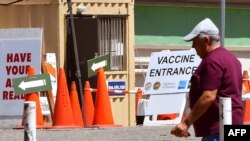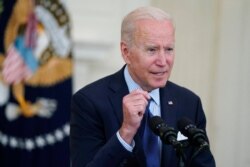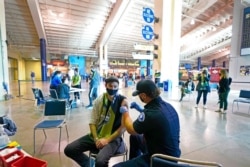U.S. President Joe Biden announced a new national COVID-19 vaccination goal of 70% of American adults having received at least one coronavirus vaccine dose by July 4 — a new benchmark for returning the country to a semblance of normalcy in conjunction with the celebration of the anniversary of America's independence.
"That means giving close to 100 million shots — some first shots, other second shots — over the next 60 days," the president said in an address from the White House on Tuesday.
About 40% of U.S. adults are now fully vaccinated against COVID-19, according to the Centers for Disease Control and Prevention.
Senior administration officials say that if 70% to 85% of the U.S. population is vaccinated, that will result in a significantly lower infection rate, putting the country on the path to a return to normal life.
Biden also announced he is directing tens of thousands of pharmacies in the federal pharmacy program to offer walk-in appointments and redirecting government resources to support more pop-up and mobile clinics and smaller community vaccination sites.
The federal government, Biden announced, will also be shipping new allocations of the vaccine to rural health clinics across the country and providing more funds for communities to encourage people to get vaccinated.
The 'less eager'
"Now, we're going to have to bring the vaccine to people that are less eager," Biden explained.
The White House is also launching a comprehensive plan to inoculate adolescents once the Food and Drug Administration authorizes the Pfizer vaccine for younger people, as expected within weeks.
"So, my hope is that if the vaccine is authorized, parents will take advantage of it and get their kids vaccinated," the president said.
States that are seeing flagging demand for COVID-19 vaccines or not ordering their full allocation of COVID-19 vaccines will see extra supplies delivered to other states, according to the White House.
Doses have gone unused recently in a number of states.
States can still order up to their full allocation based on population or order less than their full allocation, White House press secretary Jen Psaki explained on Tuesday. "The doses that are not being given to that state will then go into kind of an overarching supply that could then be distributed to other states by population."
Differences among states
These disparities are already evident.
The state of Virginia, for example, has repeatedly been able to use all the doses the federal government has allocated to it, while Arkansas, where only one-third of people age 16 and older have been fully immunized, last week declined the entire share it had been authorized.
In all, more than 20 states are not ordering all the available vaccine doses allocated to them, according to a tally by CBS News.
Biden on Tuesday said there is a lot of misinformation about COVID-19 and the vaccine, and that those who are not fully vaccinated can die from the disease.
"This is your choice. It's life and death," Biden said bluntly.
The United States is committed to sending 60 million doses of the coronavirus vaccine made by AstraZeneca to other countries beginning this month, Biden noted, indicating that hard-hit countries such as Brazil and India would be among the initial recipients.
"I'll have more to say about that soon," he said.
Meanwhile, the U.S. trade representative (USTR) called Tuesday for vaccine production to be expanded globally in order to bring a quicker end to the pandemic and bring about economic recovery.
Noting what she called "the global inequity in vaccine access," Katherine Tai, in remarks to a conference of the Council of the Americas, said widening vaccine production "is not just a public health requirement. Our economic recovery depends on it."
Tai has been meeting with top executives of the major vaccine makers in part to discuss a World Trade Organization waiver of intellectual property rights on coronavirus vaccines.
USTR has made no recommendation yet on the rights waiver, Psaki told reporters.
When Biden was asked about the waiver, he replied, "We're going to decide that as we go along."








